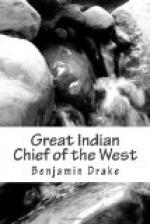would come to see him; he wished to hold a council
with him, as he had given up all intention of going
to war. At the conclusion of this talk, a party
of white men came in on horseback. We saw by
their countenances that something had happened.
A general tumult arose. They looked at us with
indignation—talked among themselves for
a moment, when several cocked their guns; in a second
they fired at us in the crowd; our companion fell
dead. We rushed through the crowd and made our
escape. We remained in ambush but a short time,
before we heard yelling, like Indians running an enemy.
In a little while we saw some of the whites in full
speed. One of them came near us. I threw
my tomahawk and struck him on the head, which brought
him to the ground. I ran to him and with his
own knife took off his scalp. I took his gun,
mounted his horse, and took my friend here behind
me. We turned to follow our braves, who were
running the enemy, and had not gone far before we
overtook a white man, whose horse had mired in a swamp.
My friend alighted and tomahawked the man, who was
apparently fast under his horse. He took his
scalp, horse and gun. By this time our party was
some distance ahead. We followed on and saw several
white men lying dead on the way. After riding
about six miles, we met our party returning. We
asked them how many of our men had been killed.
They said none after the Americans had retreated.
We inquired then how many whites had been killed?
They replied they did not know; but said we will soon
ascertain, as we must scalp them as we go back.
On our return we found ten men, besides the two we
had killed before we joined our friends. Seeing
that they did not yet recognize us, it being dark,
we again asked, how many of our braves had been killed?
They said five. We asked who they were.
They replied that the first party of three, who went
out to meet the American war chief, had all been taken
prisoners, and killed in the encampment; and that
out of a party of five who followed to see the meeting
of the first party and the whites, two had been killed.
We were now certain that they did not recognize us,
nor did we tell them who we were, until we arrived
at our camp. The news of our death had reached
it some time before, and all were surprised to see
us again."[8]
Such is the narrative of this defeat, as given by Black Hawk, and two of his men who were the bearers of his white flag and a proposition to surrender. The accounts given by Major Stillman’s troops—for it is not ascertained that the commander published any official statement of the battle—is in substance about the following. The force under Major Stillman, two hundred and seventy-five in number, on the afternoon of the fourteenth of May, met three Indians bearing a white flag, one of whom, after having been taken prisoner, was shot down. The army encamped just before sunset, in a piece of woods, surrounded by an open prairie, about three miles from Sycamore




